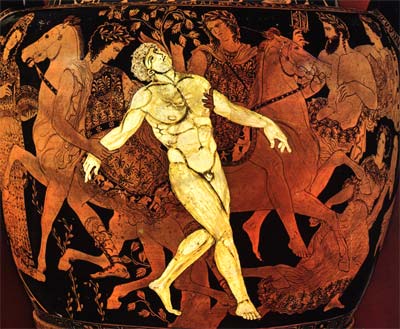

SPRING QUARTER, 2006
Department of History
University of California, Irvine
Instructor: Dr. Barbara J. Becker
|
Week 1. Soul "Talos, the Bronze Giant of Crete"
|
[A]t dawn with sails outspread they sped on before the breath of the west wind, keeping the desert land on their right. And on the next morn they saw the headland and the recess of the sea, bending inward beyond the jutting headland. And straightway the west wind ceased, and there came the breeze of the clear south wind; and their hearts rejoiced at the sound it made. But when the sun sank and the star returned that bids the shepherd fold, which brings rest to wearied ploughmen, at that time the wind died down in the dark night; so they furled the sails and lowered the tall mast and vigorously plied their polished oars all night and through the day, and again when the next night came on. And rugged Carpathus far away welcomed them; and thence they were to cross to Crete, which rises in the sea above other islands.

And Talos, the man of bronze, as he broke off rocks from the hard cliff, stayed them from fastening hawsers to the shore, when they came to the roadstead of Dicte's haven. He was of the stock of bronze, of the men sprung from ash-trees, the last left among the sons of the gods; and the son of Cronos gave him to Europa to be the warder of Crete and to stride round the island thrice a day with his feet of bronze. Now in all the rest of his body and limbs was he fashioned of bronze and invulnerable; but beneath the sinew by his ankle was a blood-red vein; and this, with its issues of life and death, was covered by a thin skin. So the heroes, though outworn with toil, quickly backed their ship from the land in sore dismay. And now far from Crete would they have been borne in wretched plight, distressed both by thirst and pain, had not Medea addressed them as they turned away:
"Hearken to me. For I deem that I alone can subdue for you that man, whoever he be, even though his frame be of bronze throughout, unless his life too is everlasting. But be ready to keep your ship here beyond the cast of his stones, till he yield the victory to me."
Thus she spake; and they drew the ship out of range, resting on their oars, waiting to see what plan unlooked for she would bring to pass; and she, holding the fold of her purple robe over her cheeks on each side, mounted on the deck; and Aeson's son took her hand in his and guided her way along the thwarts. And with songs did she propitiate and invoke the Death-spirits, devourers of life, the swift hounds of Hades, who, hovering through all the air, swoop down on the living. Kneeling in supplication, thrice she called on them with songs, and thrice with prayers; and, shaping her soul to mischief, with her hostile glance she bewitched the eyes of Talos, the man of bronze; and her teeth gnashed bitter wrath against him, and she sent forth baneful phantoms in the frenzy of her rage.
Father Zeus, surely great wonder rises in my mind, seeing that dire destruction meets us not from disease and wounds alone, but lo! even from afar, may be, it tortures us!
So Talos, for all his frame of bronze, yielded the victory to the might of Medea the sorceress. And as he was heaving massy rocks to stay them from reaching the haven, he grazed his ankle on a pointed crag; and the ichor gushed forth like melted lead; and not long thereafter did he stand towering on the jutting cliff. But even as some huge pine, high up on the mountains, which woodmen have left half hewn through by their sharp axes when they returned from the forest -- at first it shivers in the wind by night, then at last snaps at the stump and crashes down; so Talos for a while stood on his tireless feet, swaying to and fro, when at last, all strengthless, fell with a mighty thud.

|